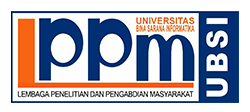IMPLEMENTASI “SUSTAINABLE EVENT MANAGEMENT” DI TANAH LOT ART AND FOOD FESTIVAL 2023
Sari
ABSTRAK
Pura Tanah Lot adalah salah satu pura terpenting bagi umat hindu di Bali selain sebagai pemujaan, area sekitar pura juga di manfaatkan sebagai tempat wisata, wahana rekreasi, maupun tempat untuk menampilkan pertujukan seni pertunjukan pariwisata bali. Salah kegiatan di DTW Tanah Lot adalah Tanah Lot Art and Food Festifal ke IV. Event festival juga bisa berdampak negative terhadap lingkungan, sering terjadi event festival mengakibatkan sampah berlebih. Selain dampak lingkungan, kegiatan event Festival dapat menciptakan dampak negatif sosial dan budaya, kemacetan lalu-lintas, dan komodifikasi budaya yang mengakibatkan ketidak puasan wisatawan dan masyarakat sendiri. Untuk itu dirasa perlu menggabungkan prinsip sustainability dalam penyelenggaraan event sebagai bagian dari industri pariwisata. Konsep sustainable event management merupakan adaptasi dari tiga prinsip dasar sustainable development yaitu environment responsibilities, economic responsibilities, dan social responsibilities (diadopsi dari The Triple Bottom Line Approach, Green Meeting Industry Council dalam United Nations Office at Nairobi and United Nations Environment Programme, 2012). Tujuan dari penelitian ini adalah untuk mengetahui implementasi konsep sustainable event management di Tanah Lot Art And Food Festival, Khususnya dalam bidang sosial, ekonomi, dan lingkungan. Dalam penelitian ini peneliti menggunakan metode penelitian kualitatif, Penentuan responden pada penelitian ini akan dilakukan dengan menggunakan teknik purposive sampling. Dalam pengolahan data dari hasil kuesioner yang di peroleh dari pegelola DTW tanah lot dan pengunjung. Setelah diolah da memperolah data olahan selanjutnya ditarik kesimpulan. Hasil penelitian ini dalam penyebaran kuesioner kepengelola DTW Tanah Lot dan pengunjung management event berkelanjutan di Tanah Lot Art and Food Festival untuk bidang ekonomi dan sosial sudah di impelemntasikan sedangkan dalam bidang lingkungan belum sempurna dalam pengimplementasikanya yaitu penghematan energi dan meminimalkan emisi dan meminimalkan dampak sampah yang terjadi. Untuk meningkatakan implementasi manajemen event berkelanjutan perlu meningkatankan program daur ulang sampah dan penggunaan produk ramah lingkungan. memberikan edukasi kepada pengunjung dan pedagang tentang pembuangan sampah dengan benar. Menerapkan lebih banyak teknologi hemat energi. Mendorong penggunakaan kendaraan ramah lingkungan bagi pengunjung dan pedagang.
Kata Kunci : Implemetasi, Manajemen Event Berkelanjutan, Tanah Lot
ABSTRACK
Tanah Lot Temple is one of the most important temples for Hindus in Bali. Apart from being a place of worship, the area around the temple is also used as a tourist attraction, a recreational vehicle, and a place to display Balinese tourism performing arts performances. One of the activities at DTW Tanah Lot is the IV Tanah Lot Art and Food Festival. Festival events can also have a negative impact on the environment; they often result in excess waste. Apart from environmental impacts, festival event activities can create negative social and cultural impacts, traffic jams, and cultural commodification, which result in dissatisfaction with tourists and the community itself. For this reason, it is deemed necessary to incorporate the principles of sustainability in organizing events as part of the tourism industry. The concept of sustainable event management is an adaptation of three basic principles of sustainable development, namely environmental responsibilities, economic responsibilities, and social responsibilities (adopted from The Triple Bottom Line Approach, the Green Meeting Industry Council in the United Nations Office at Nairobi, and the United Nations Environment Program, 2012). The aim of this research is to determine the implementation of the concept of sustainable event management at the Tanah Lot Art and Food Festival, especially in the social, economic, and environmental fields. In this study, researchers used qualitative research methods. Determining respondents in this study will be carried out using purposive sampling techniques. In processing data from the results of questionnaires obtained from Tanah Lot DTW managers and visitors, After processing and processing the processed data, conclusions are then drawn. The results of this research in distributing questionnaires to Tanah Lot DTW management and visitors to sustainable event management at the Tanah Lot Art and Food Festival for the economic and social sectors have been implemented, while in the environmental sector the implementation is not yet perfect, namely saving energy, minimizing emissions, and minimizing the impact of waste that occurs. . To increase the implementation of sustainable event management, it is necessary to increase waste recycling programs and use environmentally friendly products. provide education to visitors and traders about proper waste disposal. Implement more energy-saving technologies. Encourage the use of environmentally friendly vehicles for visitors and traders.
Keywords: Implementation, Sustainable Event Management, Tanah Lot
Kata Kunci
Teks Lengkap:
PDFReferensi
Anggraini, K. (2023). Strategi Komunikasi Pemasaran Penyelengaraan Event Dan Festival Pariwisata Di Kabupaten Banyuwangi. Jurnal Netnografi Komunikasi, 2(1), 27–35.
AZWAR, H. (2018). THE POTENTIAL DEVELOPMENT OF TOURISM ATTRACTION IN TOURISM DESTINATION OF IKAN SAKTI SUNGAI JANIAH, SUBDISTRICT BASO, DISTRICT AGAM, WEST SUMATRA.
Katzel, C. T. (2007). Event greening: Is this concept providing a serious platform for sustainability best practice. Stellenbosch: University of Stellenbosch.
Mamonto, N., Sumampow, I., & Undap, G. (2018). Implementasi Pembangunan Infrastruktur Desa Dalam Penggunaan Dana Desa Tahun 2017 (Studi) Desa Ongkaw Ii Kecamatan Sinonsayang Kabupaten Minahasa Selatan. Jurnal Eksekutif, 1(1).
Mende, V. C., Kainde, Q. C., & Sangkop, F. I. (2023). Virtual Tour Pariwisata Kelurahan Lahendong Berbasis Web Menggunakan Metode Prototyping. Jurnal Penelitian Rumpun Ilmu Teknik, 2(2), 187–199.
Nadya Priscilla Nauli. (2020). Konsep Perencanaan Festival Musik Untuk Anak-Anak Di Sma Teruna Muda Cibubur. Medialog: Jurnal Ilmu Komunikasi, 3 No 2(Vol. 3 No. 2 (2020): Medialog: Jurnal Ilmu Komunikasi), 201–207. https://doi.org/https://doi.org/10.35326/medialog.v3i2.772
Saepulloh, A., & Adeyadi, M. (2019). Aplikasi Scanner Berbasis Android Untuk Menampilkan Data Id Card Menggunakan Barcode. Jurnal Manajemen Dan Teknik Informatika (JUMANTAKA), 3(1).
Sukmana, E., Brahmantyo, H., & Hira, T. (2020). Analisis Potensi Wisata Berbasis Budaya dengan Pendekatan Community Based Tourism (CBT) di Desa Budaya Lung Anai, Kutai Kartanegara. Edutourism Journal Of Tourism Research, 1(1), 1–11.
DOI: https://doi.org/10.31294/par.v11i1.21629










